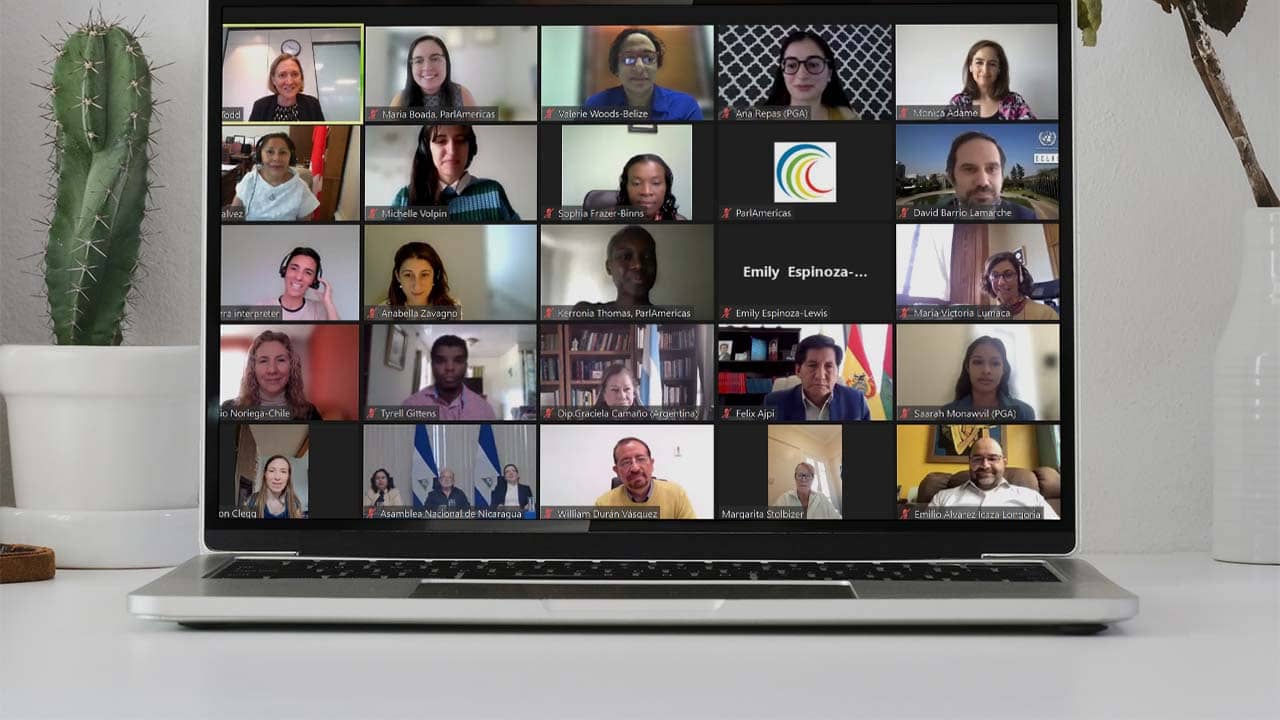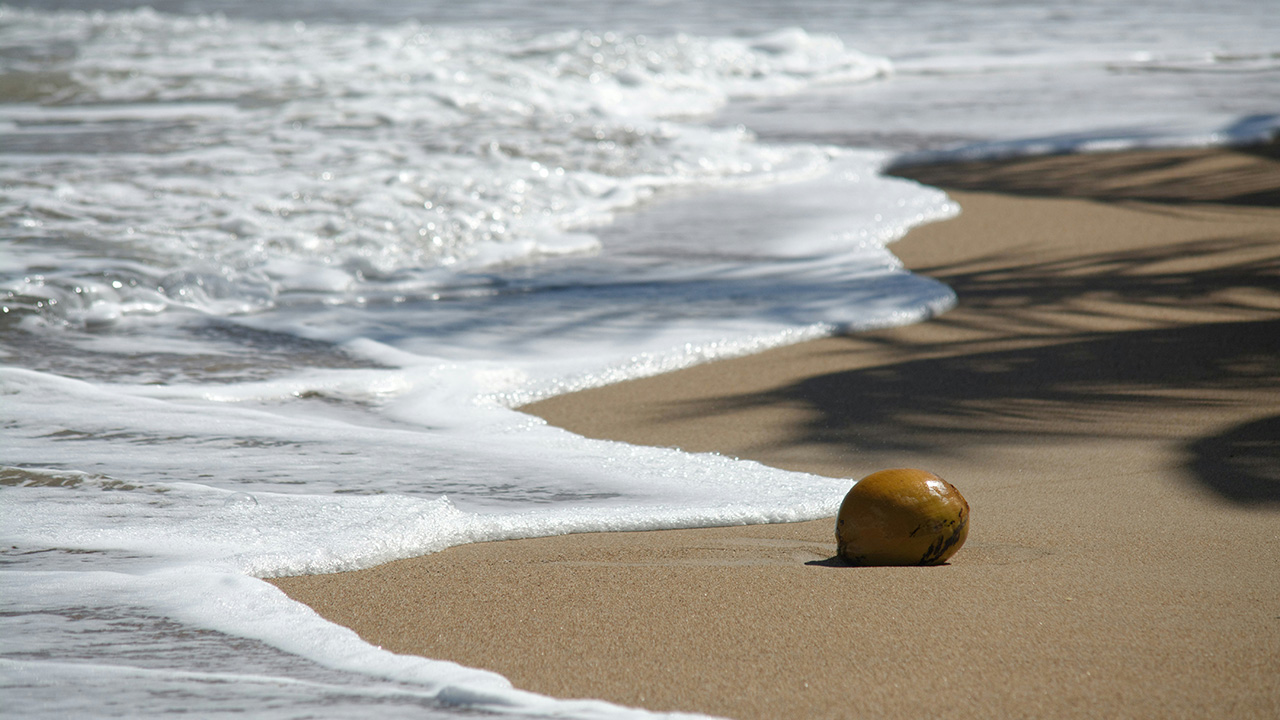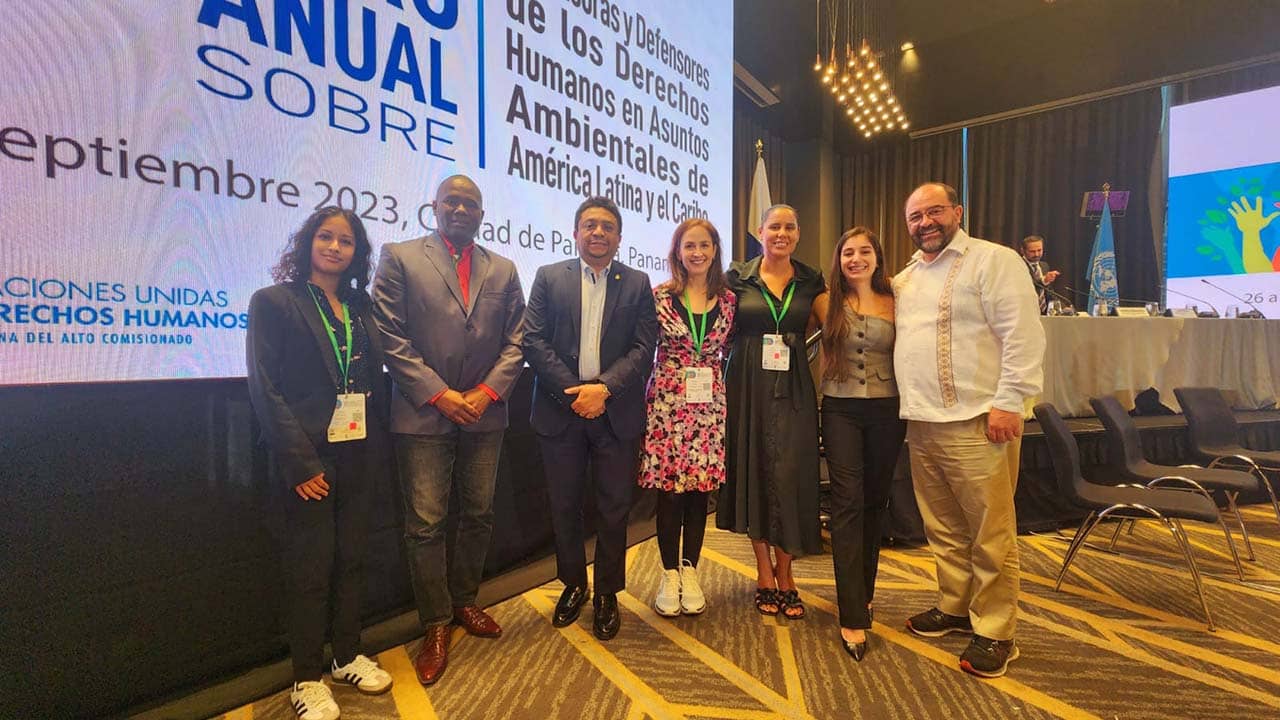
On July 11th, ParlAmericas and Parliamentarians for Global Action (PGA) jointly hosted a virtual event, “Towards effective environmental governance: Access to information, participation, and justice,” bringing together parliamentarians and civil society representatives from the Americas and the Caribbean to identify and reflect on the challenges and opportunities linked to effective and inclusive environmental governance, building upon the momentum created by this year’s 2nd Conference of the Parties (COP2) to the Escazú Agreement.
PGA Board Member and Climate Action Campaign Convenor Hon. Valerie Woods, MP (Belize), Speaker of the House of Representatives, and Sen. Rosa Galvez (Canada), President of ParlAmericas Parliamentary Network on Climate Change, welcomed participants and noted the Escazú Agreement’s importance to recognize, protect, and promote the rights of all human rights defenders in environmental matters and for effective environmental governance.
The Escazú Agreement is a groundbreaking regional agreement for Latin America and the Caribbean that ensures the three rights of access to information, participation, and justice for all human rights defenders in environmental matters. Briefing participants on the current status of the Agreement, Mr. David Barrio Lamarche, Environmental Affairs Officer, Escazú Agreement Secretariat, ECLAC, noted the need for more countries to ratify the Agreement and to mobilize resources to support its effective implementation, underlining the important role of parliamentarians in this process. Mr. Barrio Lamarche highlighted the importance of the Agreement in securing the human right to a clean, healthy, and sustainable environ ment through the effective implementation of the Agreement’s access rights to inform evidence-based policies for the repair and prevention of environmental degradation through multi-stakeholder cooperation.
PGA Board Member Dip. Margarita Stolbizer (Argentina) facilitated the segment entitled “Multi-stakeholder perspectives for inclusive environmental governance” and welcomed the sharing of lessons learned to ensure effective implementation and protections of the rights to access justice, information, and participation in environmental matters. She stressed the unique role parliamentarians play in ensuring the protection of human rights through the effective implementation of this groundbreaking regional Agreement.
Sen. Sophia Frazer-Binns (Jamaica), Shadow Minister of Land, Environment and Climate Change, underscored the positive impact the Escazú Agreement could have in Jamaica to advance justice and access rights in environmental matters. Sen. Frazer-Binns noted the critical role of parliamentarians in raising awareness through active engagement with the public, sharing parliamentary initiatives to prioritize this discussion within their national agendas, and the importance of cross-partisan cooperation amongst parliamentarians to ensure the protection of human rights for all. Sen. Frazer-Binns highlighted the importance of the Agreement’s right to access information, recognizing it is to the benefit of all people, and emphasized the value of mutli-stakeholder participation since impacts of decisions on the environment are relevant to all and should be made accessible to the public.
PGA Board Member Sen. Emilio Álvarez Icaza (Mexico), Secretary of the Commissions on Human Rights and on Metropolitan Areas and Mobility, reflected on the need to act quickly and to learn from others in the region concrete actions to implement this unique treaty, which is at the forefront of international human rights law. Emphasizing the Agreement has allowed cross-party collaboration for common ground in Mexico, Sen. Álvarez Icaza noted the particular importance of the Agreement’s right to access justice in environmental matters where existing mechanisms throughout the region are neither sufficient nor effective in protecting those at the forefront of defending this newly recognized human right. Sen. Álvarez Icaza called for action to protect human rights of environmental defenders and raise visibility about their impact on all communities, further emphasizing that those at the forefront are typically those whose rights are already marginalized – often women, afro-descendent and indigenous peoples.
Mr. Tyrell Gittens, youth representative from Trinidad and Tobago, emphasized the important role of civil society in the effective implementation of the Agreement, and reflected on the need to take action toward more inclusive environmental decision-making processes and for increased cooperation throughout Latin America and the Caribbean. Underscoring the importance of the Agreement’s right to access participation, Mr. Gittens noted the need to both safeguard existing rights for public participation and ensure youth are able to engage with the decision-making process for the protection of their lives, livelihoods, biodiversity and heritage threatened by environmental degradation.
During the interactive segment, Sen. Janelle Chanona (Belize) reflected on Belize’s recent ratification of the Escazú Agreement and the importance of taking action towards the robust implementation of this unique regional Agreement. Sen. Chanona highlighted the importance of ensuring civil society has access to public consultation and participation, and the efforts necessary to review existing legislation to identify actions to be taken for the effective implementation of the Escazú Agreement.
Dip. Graciela Camaño (Argentina), Member of the Natural Resources and Conservation of the Human Environment Committee, remarked on the importance of parliamentarians engaging in negotiations on environmental decision-making at the international level and their duty as the representatives of the people to participate in the Conference of the Parties of the Escazú Agreement. Continuing the discussion, Hon. Radjendrekoemar Debie, MP (Suriname), Chair of the Committee on Spatial Planning and the Environment and the Committee on Climate Change, and Sen. Felix Ajpi (Bolivia), Member of the Commission of Plural Economy, Production, Industry and Industrialization, agreed on the relevance of collaboration in Latin America and the Caribbean under the Agreement, highlighting the need for increased cooperation between Governments and Parliaments.
Sen. Cecilia Requena (Bolivia), Member of the Commission for Land and Territory, Natural Resources and the Environment, and Member of the Committee for the Environment, Biodiversity, Amazonia, Protected Areas and Climate Change, highlighted the link between exercising human rights and access to justice, noting the deterioration of democratic principles as one of the main obstacles to the implementation of the Agreement. From Colombia, Ms. Julia Miranda Londoño, IUCN-WCPA Deputy Chair, urged countries that have not yet ratified the Agreement to do so pointing out the pertinence of this multi-stakeholder session in informing, disseminating and clarifying the importance of the Agreement as a common platform for the region in environmental matters.
Ms. Mónica Adame, PGA Secretary-General, and Ms. Alisha Todd, ParlAmericas Director General, jointly closed the session, noting the renewed enthusiasm demonstrated by parliamentarians and CSO representatives in working together to find concrete solutions for a more inclusive environmental governance and advancing the ratification and implementation of the Escazú Agreement for the protection of all human rights defenders in environmental matters.




